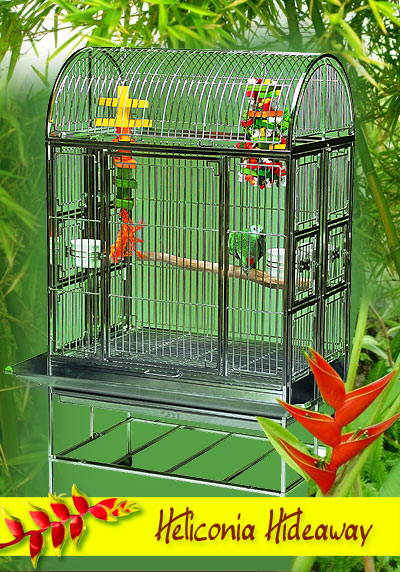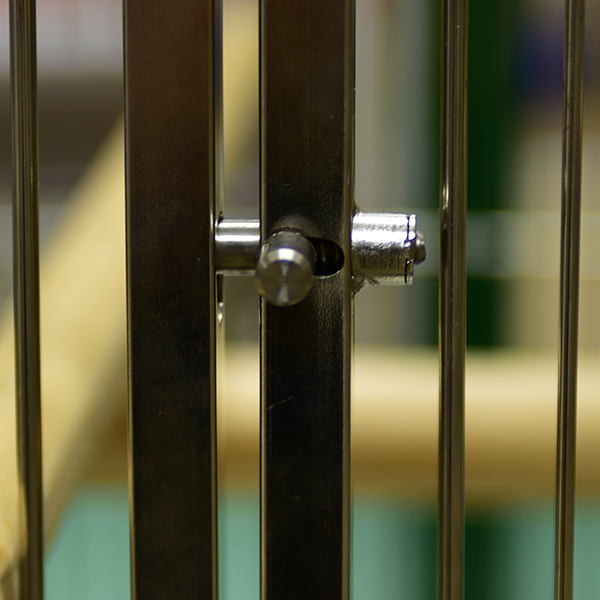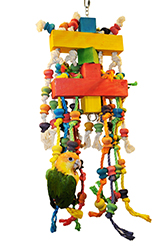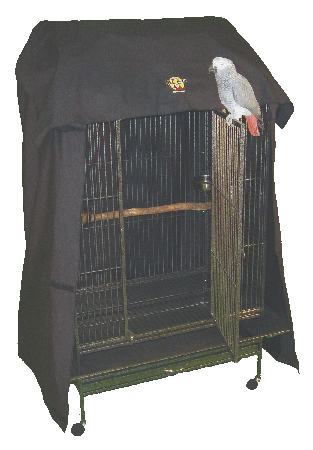Here is the big question a lot of our readers face:
” I have a household of cats but I do wish to bring a bird into it. How on earth do I go about it?”
It is not an easy situation and hopefully we at BirdCages4Less.com can help you through the process.
So, here is how we get from this.
To this.
If you have a cat and want to adopt a bird, or vice versa, you may be worried about whether the 2 animals will get along. Because cats are natural hunters and tend to prey on birds, it’s inherently dangerous to keep the 2 types of pet in the same house. However, by making your birdcage as safe as possible and by keeping your cat and your bird separated, you can make keeping a cat and a bird in the same house much less dangerous.
Method 1
Making Your Birdcage Safe

1 Opt for a cage that is heavy and sturdy so it won’t be knocked down. House your bird in a large, bottom-heavy cage that is ground-based rather than hanging from a post or the wall. Your cat will be more likely to knock over a small, lightweight cage, which can seriously stress out or injure your bird.
- For maximum safety, opt for a cage that is large enough in diameter so that your bird can avoid any probing paws that your cat might stick through the bars by retreating to the center of the cage.
2 Make sure the cage door has a lock on it to keep the cat from opening it. Rather than a simple latch, which your bird or cat may be able to open, use a sliding lock or a padlock to secure the birdcage door. This will not only help keep your cat from being able to attack your bird, but will also prevent your bird from possibly escaping its cage.
- You can also invest in a solid door for the birdcage rather than a door with bars on it to better keep your animals from being able to open it.
3 Get a cage with bars that are 1⁄2 to 3⁄4 inch (1.3 to 1.9 cm) apart. This is a reasonable amount of space that will still allow you and your bird to see through the cage, but will also keep your cat’s paws out of it. You can also have the space between the bars be as small as 1⁄4 inch (0.64 cm) wide, but it should never be larger than 3⁄4 inch (1.9 cm).
- For best results, opt for a birdcage with bars made of metal instead of plastic. Metal bars are much stronger than plastic ones and will do a better job of keeping your animals separated.
4 Have hiding spots inside the cage that the bird can feel safe in. Place toys, perches, and nest boxes in the cage so that the bird can hide in these whenever it feels threatened. Avoid placing the birdcage in the middle of a room or a high-traffic area, as this will also frighten your bird and put it under constant stress.
- The best location for your birdcage is in the corner of a quiet room, where there are 2 walls located behind it. This will make the cage feel more like a safe nest for your bird.
- You can buy perches and nest boxes for your birdcage at any pet store that sells bird supplies.
5 Drape a cover over the cage at night. Use a large cage cover made out of a breathable fabric, like cotton or linen, that will block out light when you put it over the cage. Having this cover over the cage will help your bird feel safe, since it will no longer feel like it is being watched by a preying cat.
- You can buy a cage cover specifically designed for birdcages at any pet store that sells bird supplies. You can also repurpose a large piece of fabric to use as a cover, as long as it is thick enough to block out light.
- For best results, make sure your cage cover is machine washable. It will definitely accumulate dust and dander after being draped over your birdcage multiple times.
Method 2
Separating Your Cat and Your Bird
1 Refrain from keeping a cat and an “outgoing” bird in the same house. Larger birds, such as parrots, are not content to stay in their cage and enjoy roaming around the house. This will almost inevitably lead to a confrontation with any cat that lives in your house, so stick to smaller bird species if you plan to keep a cat as well.
2 Close the door to the room your bird is in when you’re not around. No matter how well trained your animals are, if your cat’s instincts kick in and it tries to attack the bird, one of your pets can get seriously hurt or even die. Never give them the opportunity to interact with each other unsupervised
- If your cat still attacks the birdcage even when you’re in the same room, you may have to ban your cat from that room entirely and always keep the door closed.
3 Give your cat other sources of stimulation in your house. If your cat is relatively active and you intend to keep it indoors, giving it toys and other interactive stimuli may keep it from being overly interested in your bird. Place interesting toys like food puzzles, crinkle toys, and scratching posts in various spots throughout your house that will keep your cat far away from the birdcage.
- There are lots of different toys you can buy for your cat that will keep its interest. Look for these toys at any pet store.
- If your cat is interested in birds and the outdoors in general, consider investing in a cat tower and placing it near a window. This will allow your cat to focus on birds in the wild instead of the one in your house.
4 Invest in a cat enclosure to keep your cat outside. Use this method in particular if your cat is an outdoor cat and is used to hunting birds in the wild. This is ultimately the only way to make absolutely sure that your cat will not end up hurting or killing your bird.
Hopefully, you can get your buddies to play nice nice after reading this. This is what we want you to come home to!

2,621 total views, 2 views today



